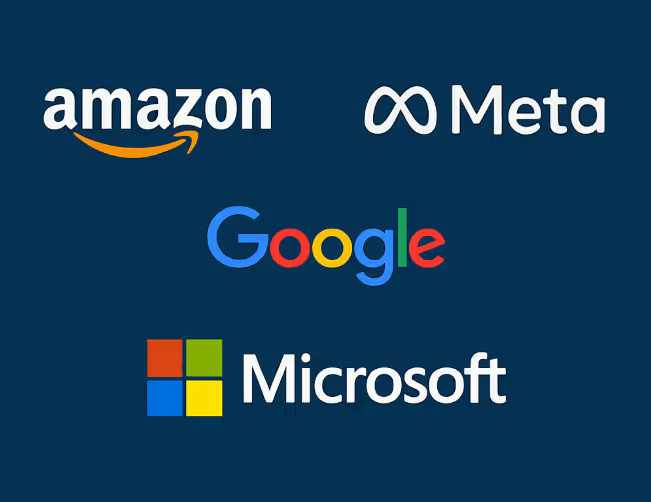Stay informed with our newsletter.
.webp)

.webp)

The AI brand wars have officially begun as major tech giants - Amazon, Google, Meta, and Microsoft, redefine their identities around generative AI. No longer just a backend tool, AI is now central to consumer experience, brand positioning, and trust. From Alexa’s shift to workplace assistant to Google’s Gemini in productivity tools and Meta’s AI-powered social platforms, companies are making AI a visible, branded part of their ecosystem. It's a strategic shift reshaping the future of digital engagement.

There’s a seismic shift happening in the tech landscape, not just in how generative AI is developed, but in how it's branded, marketed, and integrated into everyday consumer life. What was once a back-end tool for developers is now front-and-center, wearing the company logo and speaking directly to users. Amazon, Google, Meta, and Microsoft are no longer just building AI, they’re becoming AI-first brands.
Welcome to the era of the AI Brand Wars.
These industry giants are in an arms race not only to develop the most powerful models but also to make AI inseparable from their public image and user experience. Each is making bold moves, reorienting core products and launching sweeping marketing campaigns to stake their claim. The goal? To own not just the tech, but the trust, mindshare, and daily relevance that come with it.
Let’s break down the changes and what they mean for the future of brand identity in an AI-first world.
Alexa, once a friendly voice in your kitchen timer or smart speaker, is getting a new job description. Amazon has repositioned Alexa as a workplace AI assistant, integrating it deeper into AWS tools and enterprise workflows. Rather than competing on the turf of home automation alone, Amazon is now pushing Alexa as a productivity tool for meetings, documentation, and customer service.
Marketing has shifted accordingly, from cheerful home scenes to sleek office environments, showcasing Alexa summarizing meetings, generating reports, and interfacing with internal databases. The rebranding reflects Amazon’s broader ambition to be seen not just as a marketplace, but as a serious enterprise AI provider.
Key shift: Alexa moves from consumer novelty to business necessity.
Google has officially rebranded its generative AI under the “Gemini” umbrella. What began as Bard has now evolved into a full-stack AI assistant embedded across Gmail, Docs, Search, Android, and Chrome. Gemini is no longer a sandbox experiment—it’s the new face of Google’s core products.
This move is highly strategic. By putting Gemini in the user flow of productivity tools and mobile devices, Google positions its AI as inseparable from daily life. It’s also a clever brand play, giving its AI a distinct, evocative identity that’s separate from the corporate “Google” name, yet deeply tied to its infrastructure.
The advertising message is clear: Gemini makes you smarter, faster, and more capable. It’s Google, but supercharged.
Key shift: Gemini becomes a branded AI layer over Google’s product suite.
Meta is taking a very different tack, leaning heavily into culture and expression. Instead of enterprise or productivity, Meta is embedding generative AI into Threads, Instagram, and Messenger, enabling users to interact with AI avatars, generate content, and even co-create with virtual influencers.
For Meta, this is a brand extension of its “metaverse” vision, only now grounded in generative AI rather than virtual reality. AI personas are presented not as tools, but as collaborators. Think of it as the fusion of identity, creativity, and entertainment.
This approach is deeply social and visual, aimed squarely at younger audiences who value customization, creativity, and personality. Meta isn’t just building AI features; it’s redefining the platform experience through them.
Key shift: AI becomes part of your social identity and creative process.

There was a time when AI lived behind the scenes: it powered recommendations, improved search, and optimized logistics. But that era is over. Today, AI is the interface, the experience, and increasingly, the narrative.
Each tech giant is using AI to reposition its brand identity:
In every case, the AI isn’t hidden. It’s branded. It’s personified. It’s part of the user relationship. This changes the game for marketers, strategists, and brand custodians across industries.
As generative AI continues to evolve, every brand, regardless of industry, must confront the same strategic questions:
In the same way cloud computing redefined tech brands in the 2010s, generative AI is doing the same today. But there’s a key difference: AI isn’t just changing how you operate, it’s changing how you’re perceived.
Consumers are beginning to associate brands not just with products, but with their AI personalities, their stance on ethics, and the user experience they deliver through AI. This means your AI strategy is now a reputational strategy.
The AI Brand Wars aren’t just a Big Tech spectacle. They’re a blueprint and a wake-up call, for every organization looking to stay relevant in the next decade.
Whether you’re in retail, healthcare, education, or finance, the message is clear:
"Your AI narrative isn’t optional. It’s strategic. It’s emotional. And it’s already here.”
For questions or comments write to contactus@bostonbrandmedia.com
